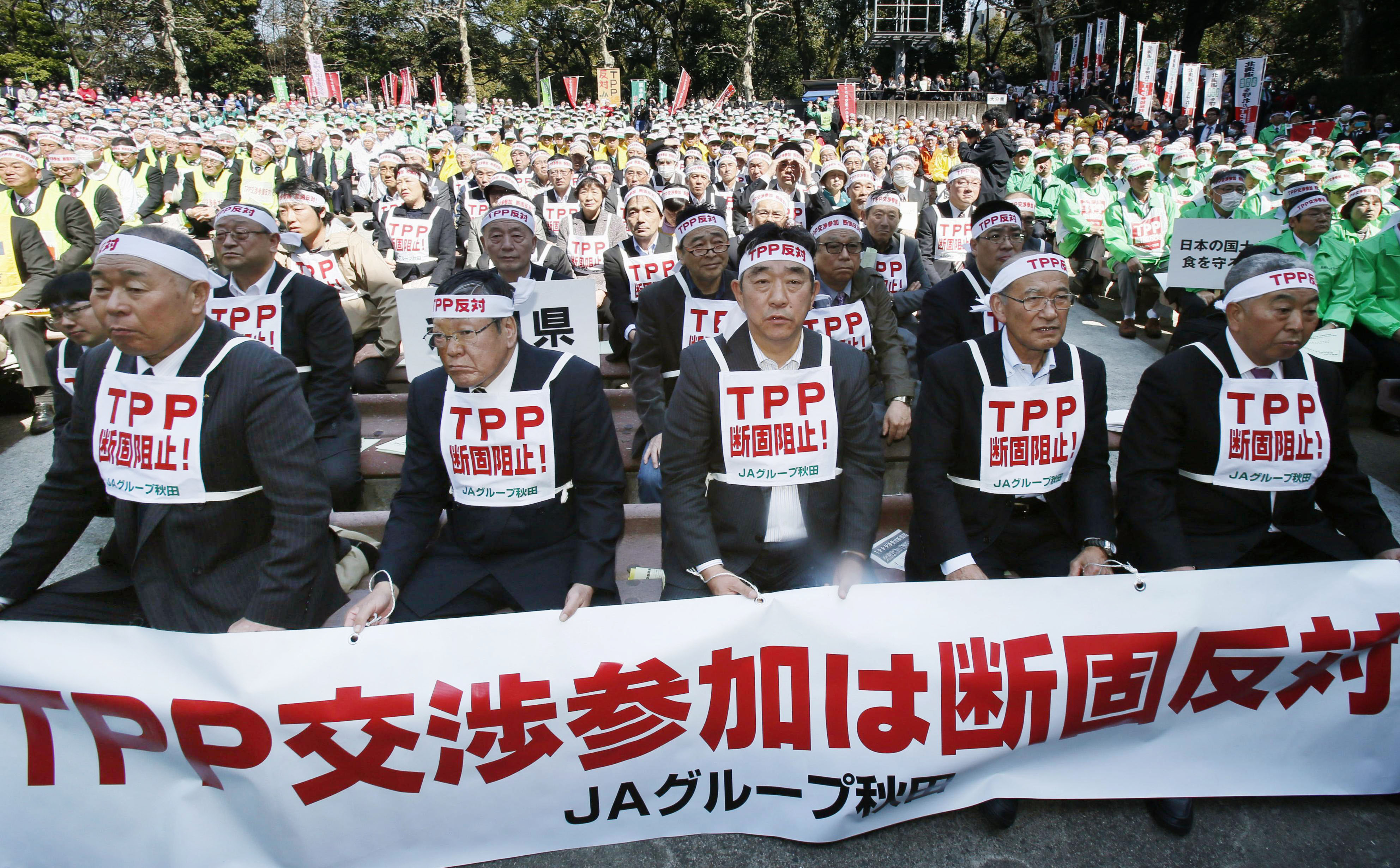Japan’s prefectures map out damage to agriculture sectors by TPP trade pact
The Japan Times | 7 March 2016
Japan’s prefectures map out damage to agriculture sectors by TPP trade pact
by Eric Johnston
With Prime Minister Shinzo Abe’s Cabinet expected to approve a set of bills related to the Trans-Pacific Partnership agreement, the stage is set in the Diet for a debate on the controversial 12-nation deal.
Now, adding to the national political debate will be local economic projections on how the TPP will affect prefectural agriculture, forestry, and fisheries sectors.
In December, the central government projected adopting the TPP would mean a national decline of ¥130 billion to ¥210 billion on 33 items in these sectors. Since then, various local governments have done their own calculations to determine what the local post-TPP economic impact might be and how much financial assistance might be needed for local farmers, fishermen, and those in the pulp industry who lose out to cheaper foreign imports.
Such assistance includes efforts to promote prefectural agricultural products overseas as high-value gourmet items.
All prefectures expect declines, but the amount depends on the prefecture and the sector. However, so far most local projections for the rice sector say it will be small.
In Yamanashi Prefecture, Gov. Hitoshi Goto announced last month industrial production in his prefecture would decline by ¥250 million to ¥500 million after the TPP comes into force, mostly in beef and pork production. He added there will only be a limited impact on local grape and peach farming because consumers will distinguish between local and imported grapes under the accord.
“We’ll make efforts to establish a highly competitive agriculture industry as a response to the TPP, with measures to strengthen the quality of agricultural land and income,” Goto told the prefectural assembly last month.
A separate prefectural study, however, warned that over the mid- to long-term, there is a danger that cheaper imports will drive prices of Yamanashi fruit down, requiring measures to deal with this. Yamanashi Prefecture produces about 90 percent of domestically consumed grapes.
Meanwhile, Gifu Prefecture says adopting the TPP agreement translates into a decline of ¥400 million to ¥800 million in the beef sector, a ¥200 million to ¥400 million decline in the pork industry, a ¥100 million decline in the poultry sector, and losses of ¥100 million to ¥200 million in the egg industry.
In Kagawa Prefecture, the TPP’s adoption is predicted to induce a decline of up to ¥1.5 billion for local agriculture and seafood production. Kagawa beef production may decline by ¥520 million to ¥1 billion, while pork production could experience a decline of ¥64 million to ¥128 million. Kagawa mikan mandarin orange production could decline by up to ¥50 million. The prefecture predicts smaller declines in seafood catches of squid and sardines.
Kagawa Prefecture has allotted about ¥1.5 billion in the fiscal 2016 budget to promote local fruit and Kagawa rice to TPP member countries.
Toyama Prefecture predicts a small impact due to TPP. It concluded that there would be a total decline in local agriculture and seafood products of ¥180 million to ¥320 million. Total prefectural agricultural production in 2013 amounted to nearly ¥60 billion. Toyama also aims to sell more apples abroad under the TPP.
In Mie Prefecture, a decline of up to ¥2.6 billion over two decades is predicted for 15 sectors as tariffs are reduced in stages.
Hardest hit will be beef, sales of which are expected to decline between ¥350 million and ¥700 million. This will drive down the price of the prefecture’s famed Matsusaka beef, but prefectural officials are convinced customer loyalty will lessen the impact.
In Fukuoka, prefectural calculations show an up to ¥2 billion decline in agriculture, forestry and seafood production over several decades, though this is less than 2 percent of its current ¥112 billion in annual production.
In Hokkaido, where opposition to the TPP, especially in the central and eastern parts of the prefecture, have been among the strongest in the country, it’s predicted that local agriculture, forestry, and seafood production will decline by between ¥40 billion to some ¥60 billion or more.
“I’ve heard that the prefecture based its calculations on the central government’s method for predicting the overall decline, but further analysis is needed. In addition, there’s no inclusion of how the price of rice will be affected once cheap foreign rice enters, and no mention of an effect on other industries,” farming federation JA Hokkaido head Toshiaki Tobita said last month.






